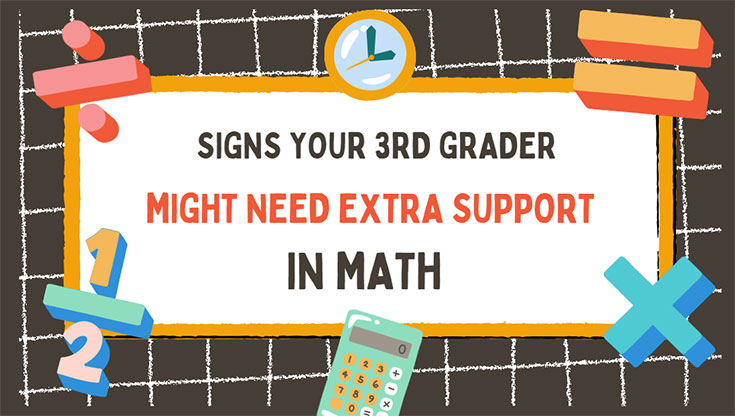Third grade marks a crucial point in a child’s mathematical development. As the complexity of math concepts increases, some students may start to struggle. Recognizing the signs that your third grader needs extra support in math is essential for addressing challenges early and preventing future difficulties.
Parents and teachers should watch for specific indicators that a child may be falling behind in math. These signs can include difficulty with basic operations, reluctance to engage in math-related activities, or expressed frustration when attempting math problems. If a child consistently makes negative comments about math or avoids math homework, it may signal a need for additional assistance.
Addressing math struggles promptly can make a significant difference in a child’s academic journey. Seeking help from a math tutor for 3rd graders in New Jersey or exploring other support options can provide tailored guidance and boost a student’s confidence in their mathematical abilities. Early intervention can help turn math challenges into opportunities for growth and learning.
Key Takeaways
- Watch for signs of math struggles, including negative attitudes and difficulty with basic operations
- Early intervention is crucial for addressing math challenges and preventing future difficulties
- Seeking additional support, such as tutoring, can significantly improve a child’s math skills and confidence
Identifying Signs of Struggle in Math
Recognizing math difficulties early can help 3rd graders get the support they need. Parents and teachers should watch for specific indicators in core skills, common problem areas, and behavioral changes.
Understanding Core Math Skills
Third grade math builds on earlier concepts while introducing new challenges. Key skills include:
- Addition and subtraction with multi-digit numbers
- Multiplication and division basics
- Understanding fractions and their representations
- Place value up to thousands
- Measurement and data interpretation
Children struggling with these foundational skills may need extra help. Watch for difficulty with mental math, slow calculation speed, or confusion with number relationships.
Common Areas of Difficulty
Some 3rd graders face challenges in specific math areas:
- Fractions: Trouble understanding parts of a whole
- Multiplication: Difficulty memorizing times tables
- Word problems: Struggle to extract relevant information
- Geometry: Confusion with shapes and spatial relationships
- Time and money: Issues with clock reading or coin values
Persistent problems in these areas may indicate a need for targeted support or potential learning disabilities like dyscalculia.
Behavioral Indicators
Changes in behavior can signal math struggles:
- Avoidance of math homework or activities
- Increased frustration or anxiety during math lessons
- Negative self-talk about math abilities
- Physical symptoms like stomachaches on math test days
- Loss of confidence in problem-solving
These signs may point to math anxiety or deeper learning challenges. Early intervention can help build confidence and prevent long-term difficulties in mathematics.
Support and Resources for Improvement
Addressing math difficulties early can make a significant difference in a child’s academic journey. With the right tools, strategies, and support, 3rd graders can overcome challenges and build confidence in their math skills.
Effective Learning Tools and Activities
Math games and apps offer engaging ways to practice key concepts. Apps like SplashLearn and Prodigy make learning fun while reinforcing skills in whole numbers, geometry, and problem-solving. Board games involving counting money or telling time also provide valuable real-world math practice.
Hands-on activities using manipulatives help solidify abstract concepts. Use building blocks for area and perimeter lessons, or fraction circles for visualizing parts of a whole. Online resources like Khan Academy offer free video lessons and interactive exercises tailored to 3rd-grade math standards.
Many schools provide access to adaptive learning platforms that adjust to each student’s level, ensuring targeted practice in areas of difficulty.
Structuring Math Practice at Home
Consistency is key when supporting math learning at home. Set aside 15-20 minutes daily for math practice, focusing on areas where your child struggles.
Break down complex problems into smaller steps. When working on multi-digit addition or subtraction, encourage your child to use the standard algorithm, explaining each step aloud.
Incorporate math into everyday activities. While cooking, practice measuring ingredients and converting units. During car rides, play mental math games with license plate numbers.
Create a positive math environment by praising effort and problem-solving strategies rather than just correct answers. This approach builds resilience and a growth mindset towards math challenges.
When to Seek Additional Support
If your child consistently struggles despite regular practice and support, it may be time to explore additional help. Many schools offer free math tutoring programs or after-school math clubs.
Online tutoring services provide one-on-one support from certified teachers. These sessions can be tailored to address specific math difficulties and fit easily into busy schedules.
For persistent struggles, consult with your child’s teacher about potential learning disabilities or the need for an Individualized Education Program (IEP). Early intervention can make a significant difference in long-term math success.
Consider summer math camps or enrichment programs to prevent summer learning loss and build confidence before the next school year.
Conclusion
Recognizing signs that a 3rd grader needs extra math support is crucial for parents and educators. Early intervention can prevent struggles from compounding in later grades. A combination of attentive observation, open communication, and targeted assistance can make a significant difference.
By addressing challenges promptly and providing appropriate support, children can develop confidence and proficiency in mathematics. This sets the foundation for future academic success and a positive attitude towards learning.






Speak Your Mind